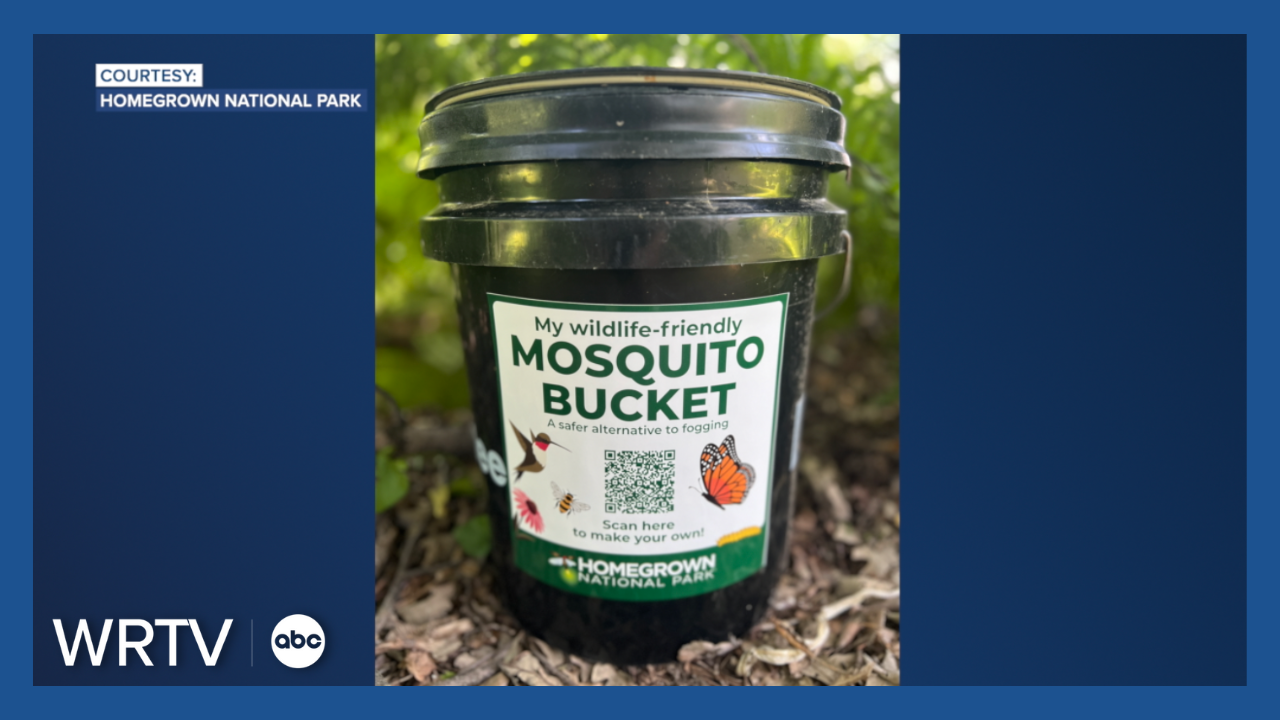You've probably heard of the Ice Bucket Challenge. Now, get ready for the Mosquito Bucket Challenge.
"I don't recommend dumping this bucket on your head," said Krista De Cooke. "It won't hurt you, but it might stink a little bit."
De Cooke is the strategic partnership and science lead for Homegrown National Park, the organization that started the challenge this spring.
"Our goal is to regenerate biodiversity and help people change their relationship with nature where they live," explained De Cooke.

Homegrown National Park has been encouraging the use of mosquito dunks for years. They turned the idea into a "challenge" this spring, and have seen the idea taking off on social media ever since.
"Over the last month or two, we've had thousands and thousands of people participating across the country," De Cooke shared.
So what exactly is this challenge?
"The mosquito bucket challenge is a way for people to manage mosquitoes on their property in a more environmentally friendly way than with fogging," explained De Cooke.
Dan Boritt, the executive director of the Indiana Wildlife Federation, said he's had mosquito buckets in his yard for about three years, and he is excited that the concept is gaining traction now.

"I just call it like backyard mosquito control, but anything we can do to get people interested in this, make it viral, make people understand that this is an option, I think is great," Boritt shared. "I applaud them for figuring out a way to kind of make it culturally relevant."
"It's a great way to reduce their populations, make the outdoors comfortable again, but not harm the wildlife we do want to keep around," Boritt added.
"Fogging typically kills anything that's flying around when it's applied," De Cooke said. "Doesn't do a great job of controlling mosquito populations, and it can have negative effects on children and pets."
Treating for mosquitoes can be harmful to insects and pollinators.
"We are in a crisis of insect populations," said Boritt. "This is the basis for food webs. If we don't have insects, we don't have birds and bats and mammals and amphibians and reptiles and fish. All these things rely on insects as the basis of their food."
So what can you do to get rid of pesky mosquitoes, especially when we are gearing up for another hot, humid week?
Enter the mosquito bucket.
Boritt showed how easy it is to set it up.
WATCH THE TUTORIAL BELOW:
Start with a bucket, or any other outdoor container. Fill it with water. Add a mosquito dunk, which can be purchased at many hardware stores. You can top it with some straw, leaves, grass, or mulch to help attract mosquitoes.
Adding a stick into the bucket can act as a wildlife ladder for animals and insects to crawl out, in case they accidentally fall into the bucket. You can cover the bucket with some sort of lid, but make sure there are holes in it to allow the mosquitoes to fly into it.
Change the mosquito dunk about once a month.

"Mosquito bucket challenge is a really simple and affordable way to attract breeding females to your buckets where they lay their eggs," said De Cooke.
Mosquito dunks contain Bacillus thuringiensis israelensis (BTI).
"It prevents those larvae from developing. So basically, it kills all the mosquitoes before they even emerge from the bucket," continued De Cooke.
BTI only impacts mosquitoes. It does not harm other animals or insects that might come into contact with it.
"Mosquitoes are part of our ecosystem and they serve a purpose. They're food for a lot of creatures," started Boritt. "It's a fine line, right? You're killing a native species."

Boritt went on to explain that many mosquitoes are native to the Midwest, but there are also invasive species called the Asian tiger mosquito.
"These tiger mosquitoes, they'll be out all the time," Boritt shared. "They're the ones when you're sitting out at 3 o'clock in the afternoon are biting you."
Boritt shared that native species are the ones that typically come out later in the evening.
Using the mosquito bucket has suppressed the number of mosquitoes in Boritt's yard, he shared. This is something his neighbors are noticing.
"There's probably 42 houses on my block. At least seven people are doing this now," Boritt said. "It's not everyone. I wish everyone was. But that's a good number."
Homegrown National Park plans to continue the challenge next year as well, since the number of participants continues to grow.
"This is a great gateway into raising awareness, not just about how to manage mosquitoes, but about how to manage and think about your property in general," De Cooke concluded.
You can find more about the challenge here.
This article was written by Maci Tetrick for the Scripps News Group in Indiana.









